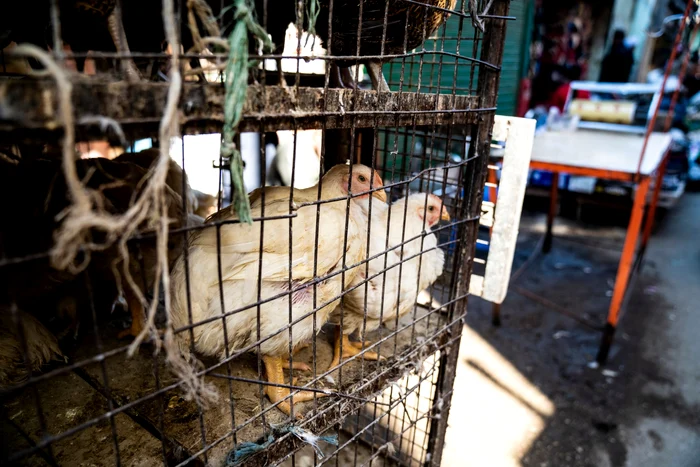“Oh God, don’t finish eating the chicken legs.”says a man begging alongside bird sellers in Egypt’s Giza market.
In Egypt, the precious chicken legs are considered a symbol of poverty in Asia Photo: Shutterstock
Egypt is facing a deep economic crisis, a situation so dire that its people are struggling to find decent sources of food, writes BBC.
The state’s most recent nutrition advisory recommended cooking chicken legs — the protein-rich part of the bird usually reserved for dog and cat food.
The suggestion sparked anger and intense criticism of the government in Cairo.
Many countries are struggling with rising inflation, but Egypt is one of the hardest hit, at over 30% in March.
For many, staples like cooking oil and cheese have become unaffordable luxuries. Some items have doubled or tripled in price within a few months.
“I eat meat once a month, or not at all. I buy chicken once a week”, Vedat, 60, a mother of three, says as she walks through the stalls. “Nowadays, even an egg is sold for 5 LE (US$0.16).”

Photo by Shutterstock
One reason Egypt is in this predicament is that it relies heavily on imported food rather than domestic agriculture to feed its more than 100 million people.
Even grain for feeding the chickens is brought into the country by ship.
In the last 12 months, the Egyptian pound lost half its value against the US dollar. Thus, in January, when the government again demonetized the currency, the price of imports such as grains rose significantly.
A year ago, Vedat was living comfortably on his 5,000 lira monthly pension. She would have described herself as middle class. Now, like many Egyptians, they struggle to make ends meet.
Today, she collected enough money to buy some chickens.
“A vendor told me that a kilo of chicken fillet costs 160 lei. Others are 175, 190, even 200Wedad says while shopping.
“Chicken legs are 90 LE, but now they even sell chicken bones – and claws are only 20.“, she adds with a sarcastic laugh.
President Adbdul Fattah al-Sisi often blames the unrest that followed Egypt’s 2011 uprising and rapid population growth for his country’s current economic problems. He also points to the epidemic that followed the war in Ukraine.
Russia’s invasion of Ukraine last March dealt a severe blow to the economy. Egypt was the second largest importer of wheat in the world, and both countries were its main suppliers. When the war halted exports, wheat – and consequently bread – became more expensive.

Photo by Shutterstock
The tourism sector also lost money as Russian and Ukrainian tourists flocked to Egypt.
Tourism, which generates about 5% of the gross domestic product (GDP), has already been hit hard by the pandemic.
Analysts say the government’s missteps have made a bad situation worse.
According to Timothy Khaldas, a political economist at the Tahrir Institute for Middle East Policy think tank, the power and influence of the presidency, the military, security agencies and intelligence have grown under President Sisi.
Kaldas says this has happened through the expansion of state-owned enterprises, for example, the military receiving government contracts for large infrastructure projects.
As a result, private sector involvement was dramatically reduced, leaving companies not affiliated with the regime unable to compete. Many foreign investors have abandoned Egypt.
Because of the difficulties it faces, Egypt has turned to the International Monetary Fund (IMF) for a bailout program four times in the past six years. Almost half of the state’s revenue is intended to repay these loans, which is 90% of GDP.
Gulf states such as the United Arab Emirates and Saudi Arabia have bought state assets to help shore up Egypt, but have also tightened conditions for further investment.
The West and its Gulf neighbors fear the consequences if the Middle East’s most populous nation goes bankrupt.
Past economic crises led to uprisings and contributed to the downfall of former presidents Hosni Mubarak and Mohammed Morsi. And there are already signs that popular anger over the economy will lead to renewed unrest.
“I can’t tell you how sorry we girls are for the black day we went to vote for you.”A video of an Egyptian housewife speaking to President Sisi is going viral on social media. “You made our lives hell”.
She counts some change from her purse and wonders how she will feed her children so much.
Meanwhile, in his apartment, Vedat chops green beans and tomatoes to prepare a traditional dish, phaseolia katra, for his grandchildren.
Her mind turns to the Muslim holy month of Ramadan. The feast consists of fasting from sunrise to sunset, but there are usually generous feasts as well.
“What will I do this year?Vedat asks, shaking his head. He imagines that even chicken will soon be off the menu.
“I can’t afford lentil soup.”

“Evil gamer. Amateur music trailblazer. Alcohol geek. Problem solver. Coffee advocate. Troublemaker. Infuriatingly humble zombieaholic.”
